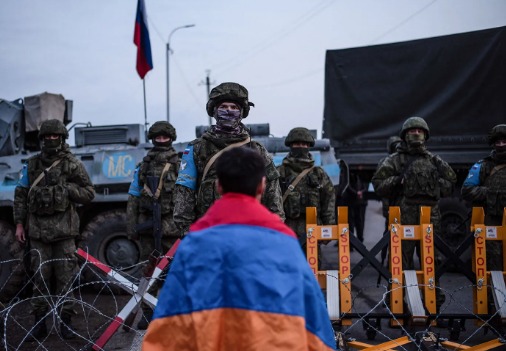Russia's recent decision to partially withdraw its troops from Armenia signifies a profound shift in the geopolitical landscape of the Southern Caucasus. Initiated after high-level talks between Russian President Vladimir Putin and Armenian Prime Minister Nikol Pachinian, this move carries far-reaching implications for regional security, Armenia's national identity, and global strategic alignments.
Ednews represents the comprehensive analysis of Dr Naim Asas director of GERISS.
Redefining Military and Security Frameworks
The partial withdrawal of Russian forces, especially from critical areas along the volatile Azerbaijan border, poses significant security challenges for Armenia. Traditionally reliant on Russian military support, Armenia is now compelled to reassess its defense strategies. This could potentially lead to Armenia seeking stronger security ties with Western entities such as NATO or forging new alliances within the European framework. Such a shift would mark a significant realignment from its longstanding military dependence on Russia, potentially enhancing Armenia's sovereignty and strategic autonomy.
Sociopolitical Changes and National Identity
The reduction of Russian military presence is likely to impact Armenian society's perception of its historical protector. If perceived as a withdrawal of support, this could fuel nationalist sentiments and prompt a reevaluation of Armenia's foreign policy priorities. The shift may encourage a more diversified foreign policy approach, reducing dependency on Russia and fostering relationships with a broader array of international partners. This could lead to a strengthening of national identity, with Armenia positioning itself as a more assertive and independent actor on the global stage.
Geopolitical Shifts and Power Dynamics
From a geopolitical perspective, Russia’s decision could be interpreted as a strategic realignment of its priorities, possibly influenced by its military engagements in other regions such as Ukraine. For Armenia, reduced Russian influence opens new avenues for enhancing ties with the European Union and possibly the United States. This realignment could significantly alter the regional power dynamics, with Armenia potentially serving as a new pivot point for Western geopolitical interests in a region that serves as a corridor for energy resources and a buffer to Middle Eastern instability.
Economic Impacts and Opportunities for Growth
Economically, the shift offers Armenia opportunities to diversify its trade and economic relationships. Moving away from Russian economic dominance, Armenia could explore new trade agreements, attract foreign investment, and participate in international infrastructure projects that decrease its economic reliance on Russia. Enhanced economic relations with European nations could bring technology transfer, development aid, and access to larger markets, contributing to Armenia's economic resilience and growth.
Regional Reactions and Strategic Adjustments
The reactions of neighboring Azerbaijan and Turkey will be crucial in shaping the post-withdrawal regional landscape. Azerbaijan may perceive the reduced Russian presence as an opportunity to assert greater influence over contested regions, potentially leading to renewed tensions. Turkey’s strategic recalibrations in response to these developments will also be critical, given its alliances and competitive stance with Russia across multiple geopolitical fronts.
Long-term Strategic Considerations
Armenia's challenge will be to leverage this transitional phase to enhance its long-term stability, security, and economic prosperity. By engaging with international partners to bolster defense capabilities and economic resilience, Armenia can secure a more balanced and independent position in international affairs. For global powers like the EU and the U.S., supporting Armenia not only serves to counterbalance Russian influence but also promotes stability and democratic governance in a strategically vital region.
In conclusion, Russia's military withdrawal from Armenia marks a critical turning point that could reshape not just Armenia’s strategic posture but also the broader geopolitical contours of the Southern Caucasus. This development calls for careful strategic planning and diplomatic engagement by all involved nations to ensure that it leads to a more stable and secure regional order.
Farid Akhund










